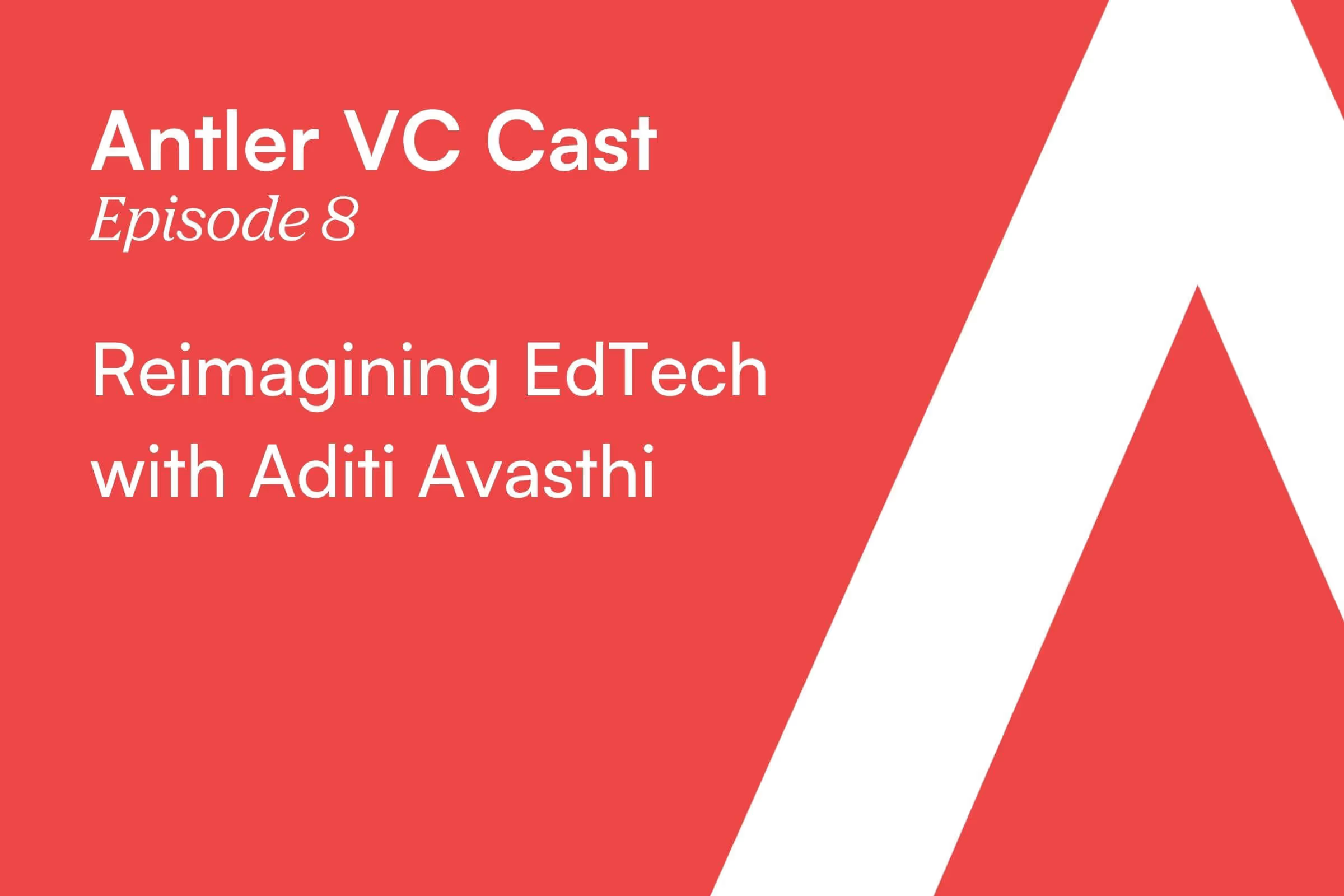Key Highlights From Transcript
[03:03] Aditi dives into the vision of Embibe of creating a no regrets future for every child.
[15:51] Aditi shares the 3 layers of the ever-evolving EdTech industry and how we should look at each layer.
[17:10] Aditi shares about designing a solution for the student's success and what needs to change.
On Embibe's mission to create a no regrets future for children
Puja Bharwani: Can we start by telling our listeners a bit about yourself, and what Embibe's mission is at its core?
Aditi Avasthi: The vision that Embibe has is, how do you create a no-regrets future for every child? We went back to 2012 and really started to research as to what the problem statement is. We obviously started with test prep (exam preparation) as a sector because it was investible, but the idea was, how do you make a person master of their own destiny by providing them the right data and information and the right context to consume content or make life choices as they go forward? It became an AI platform, because data's about and personalization is all about the number of variables you can use, and the number of ways in which you can understand a person, so that's what happened.
Jussi Salovaara: The mission you have is truly aspirational. I always find myself going back to the beginning and the origin stories. I would be fascinated to hear: how did you get started? How did you get going, especially as a solo founder?
Aditi Avasthi: I think at that point of time, looking back, right from consulting, to sales, to product development, to a bunch of different things that passed through my hands, because I'm a doer so I need to feel confident about the fact that I can do stuff. I was thinking that I'm ready to figure out my next step as an independent move and figure out a problem to solve in the world. If you look at my LinkedIn, it says, “Want to make a massive dent in the universe.”. It's just been something I was born with. I was always wanting to express myself, and get out there, and just feel extremely cathartic about my effort at the end of the day. As I clearly wanted to do something, then I thought about what space I want to focus on. It had to be in an impact-centric space for the reasons I just mentioned. It went back to my own experience growing up and then the vantage point of the four continents. How do you hit humanity and make us all so much better, and how do you do that in a pervasive way? The other space I thought about was healthcare, but I figured that tech can do so much more in education.
On creating a platform that charts learning outcomes
Puja Bharwani: Would you say with current events, in fact, the need for the way you are doing EdTech and tailoring the programs based on students' needs, has that in a way made your use case and your product far more relevant?
Aditi Avasthi: I think COVID has been quite topical for EdTech, but even before COVID, 30% to 80% of teacher posts are vacant in the country. This is not just in Indian statistics. Now think about it. If you don't have the ability to do an upfront diagnosis, like in a hospital, because there's no doctor, what would you prefer to buy, an MRI machine, or a photocopier? You need an MRI machine because you need to understand what's going on, and you need something that can add value to the situation, not just something that can. It is only as good as the guy who shows up on the camera. The thesis for us was, we've got to do contextual delivery, and then we realized contextual delivery creates learning outcomes. If you look at Embibe's mission now, we say, "We want to build a learning and life outcomes platform for the world.”
Which is also related to what I said earlier, saying, why is there no very large education company? The reason is, everybody around the world is selling inputs, but consumers, students, and parents buy outcomes.
We don't spend $150,000 to go to Harvard just because Harvard is going to give us a great textbook. We go to Harvard because it has life outcomes for us in terms of trajectory, career path, in terms of what we actually learn. Or the same thing for any great school for that matter.
The future of EdTech and what needs to change
Puja Bharwani: How should we look at EdTech in this new world?
Aditi Avasthi: The way people look at EdTech right now, there's K-12, there's higher-ed, there's vocational, there's pre-K, early learning. That's how they classify companies, that's how they classify funding raised by companies, and that's how they talk about solutions provided and things like that. If you look at basic, quote, unquote, MBA theory, it tells you that if you want to maximize the size of any space, you maximize impact on the end consumer. The only way in which a student improves is if they can go back and fix all of the stuff that they left behind.
On fundraising as a female solo founder
Puja Bharwani: When you were fundraising, you managed to go through that track pretty fast, and managed to be very successful, and that too as a solo founder. Can you tell us a bit about that journey? How did you do that and convince someone when there isn't any business plan, and there isn't any proof of concept?
Aditi Avasthi: It's actually quite interesting because I raised my first million, almost a million, seven hundred thousand, without even incorporating the company.
I used to call myself “a girl in a black and yellow cab” in Bombay with a piece of paper - that was my fundraise.
I actually did not even imagine I'd be able to raise money. In fact, one day, I thought, "I'll probably do a job and quote, unquote, incubate my idea on the side. That was my thought process. I remember my first conversation was with a VC in Mumbai, and I thought I would ask him for a job. When I opened my mouth, I choked because I couldn't talk about getting recruited. It's almost like an autoimmune response to applying for a job because I was so passionately invested in what I wanted to build. I just said I have an idea. I was almost going to say, I have a resume, but it was, I have an idea, and I started talking, and then suddenly, I had a meeting with their partners. They want to meet me, and I'm not from IIT, and I don't have a network in India, and I'm a girl, and they want to meet me.
Jussi Salovaara: That's super fascinating and exciting. To folks out there listening, a bit of a “don't try this at home” type of story, but if you want to maximize your chances, it does show anything is possible and, obviously, a testament to your incredible will and vision in making it happen. I'm very curious about the tech side of things. It sounds like from the very beginning, it was a very tech-heavy, deep-tech business that you were envisioning at the same time. I believe you're an engineer by training, but not really like a computer scientist style. How did you go about convincing the investor and getting the first tech superstars on board?
Aditi Avasthi: I love this question. When I started out, I knew we had to be adaptive because that's what I knew at that time. Initially, I think it was a lot about storing a lot of tags, storing a lot of data about the student and looking and understanding insights. Because the best machine learning algorithms start with expert training and building that initial calibration, and that's what we were doing.
Wear sparkly shoes and be yourself
Puja Bharwani: I wanted to bring this up, in terms of being in India, being a woman in tech, and that you're doing something very deep-tech, data-centric. There must have been times when a lot of times when you've been the only woman in the room. Is this something that has ever bothered you? Is there any sort of advice or something that you could tell women who are in this situation and pitching in a male-dominated environment?
Aditi Avasthi: I don't see gender in the workplace. I just see personality, and I see ideas, and that's just how I've been from the beginning. I will wear my sparkly shoes, because like I said, I don't care what other people do. That's my little thing, I'm always wearing sparkly shoes at work or something or the other like that. You're allowed to be yourself in your own company, so you don't have to portray yourself to be a certain type of person, just for the sake of it. It's a very 'be yourself' kind of attitude, and I extend that to the whole team like they're supposed to be.
On work-life management
Puja Bharwani: What advice would you give entrepreneurs to keep in mind when balancing work and life during times of crisis?
Aditi Avasthi: I feel like they are not focusing on work-life management, more than work-life balance, and they don't take the guilt if you know what I mean. They take the feedback.
There's a big difference between taking guilt and taking feedback, where you objectively try to improve yourself and get better each day in what you do, or you simply say, 'Hey, this is too much for my plate, so I've got to trade-off something'.
I think at the workplace, we've got a bunch of interesting things we've got going as policies. We have a policy we're rolling out called Whatever It Takes, so like what does it take to make you productive? I think, specifically, learning from the COVID period, where everybody's been working remotely, and I think that there's a lot more trust that's established. You basically say, 'Whatever it takes', so we'll do whatever it takes to make you comfortable. In turn, you'll do whatever it takes to make the company's vision happen. I think that allows for flexibility.









%20(1)%20(1).jpg)
%202%20(1).avif)
%20%20(1)%20(1).avif)
